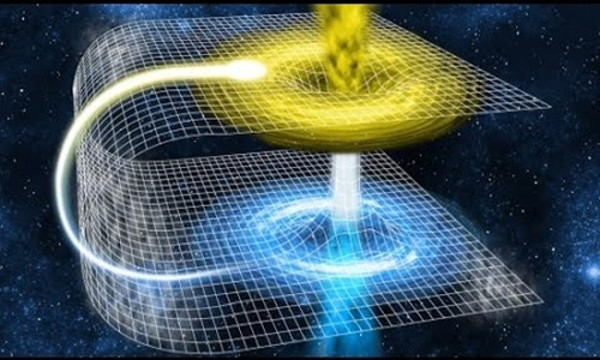Scientific perspective: Can people travel time?
According to Albert Einstein's theory of relativity, time travel is perfectly feasible if certain conditions are met and equipped with all the necessary things. Recently, an American scientist has proved this.
- 7 cases of "cross-space" mystery that science "hands up"
- Official: We have a new physical state: time crystal
- Scientists confirm: People can go through, travel time

Paul Sutter, an astrophysicist at Ohio State University, said that according to Einstein's special theory of relativity, three dimensions of time and dimension are closely related. Scientists consider them a unified entity.
But, time is still a little different, it has only one movement from the past to the future. Meanwhile, humans can move freely in space. Although, people always have to follow the flow of time, but according to the theory of relativity, not every time is the same, so we can completely control the speed to the future. Movement speed over time depends on the speed of movement in space.

If there is a rocket strong enough to be able to continuously accelerate 9.8 m / s - by the acceleration of gravity on Earth, after a few decades, it can lead people to the center of the Milky Way. 20,000 light years. But these decades have been the time people on the spacecraft feel, but when the ship returns to Earth, about 40,000 years have passed.
Although, time is only relative but still moving in the same direction with everyone. To evaluate the ability to go back in time, learn about general relativity, explain gravity as well as the complete link between space - time and movement.
Material and energy are the elements of time-bending. The current problem of people to travel time is to find ways to arrange them for a time loop to exist.
According to Sutter: "In closed time loops, people will not be able to move beyond the speed of light and time will return to the starting point, ie return to the past."
A closed time loop may exist if the universe is constantly rotating and has an increasing speed. At that time, people can return to the past.
But so far, scientists have observed that the universe is only expanding, not rotating. This shows that his theory cannot be applied.
Another hypothesis is to build a large, infinitely long cylinder and place it on the axis at a speed approximately the speed of light. At that time, the giant cylinder will pull along the surrounding time - in which there will be points on the cylinder that will return to the original position, ie return to the past. But with the current scientific technology, people have not been able to create such a large and infinite cylinder so it is not feasible.

The third hypothesis to bring people to the past or to the future is to create wormholes - short cuts that connect two points away from each other in space - time. Then, if a point moves at a speed approximately the speed of light and then pulls back to the old position, it will make this point go to the "future" of the other point thanks to the stretching effect. But to create a worm hole, there must be a "negative mass".
Although returning to the past is possible according to general relativity, in fact, there is no specific method. In contrast, researchers have not been able to give any principle of negative travel time. Science has yet to find out which particle interactions at the subatomic level prevent the formation of a closed time loop clearly.
Time with the inevitable movement from the past to the future is similar to another natural law: Entropy - the law in thermodynamics, affirms closed systems tend to change from orderly to mixed disorder. And according to Sutter, there is a certain connection between time and entropy.
You should read it
- ★ Is the speed of light slower than assumed in Einstein's theory of relativity?
- ★ Scientists confirm: People can go through, travel time
- ★ The mystery behind the stolen brain of Albert Einstein genius
- ★ 7 valuable life lessons from Albert Einstein
- ★ Albert Einstein's physics genius and 10 profound lessons about life